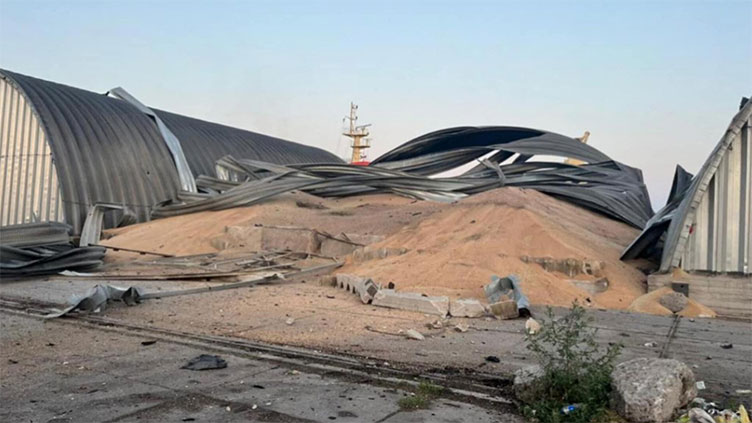Russia's Danube attacks tighten noose on Ukraine's grain sector

World
Russian air strikes on Ukrainian grain facilities on the Danube threaten route for Kyiv's exports.
KYIV (Reuters) - Russian air strikes on Ukrainian grain facilities on the Danube this week threaten a vital river route for Kyiv's exports, as Moscow seeks to tighten the noose around a key sector of the economy days after abandoning the Black Sea shipping deal.
Last week, air strikes caused tens of millions of dollars of damage to the grain sector in Odesa region, and Monday's strikes on infrastructure along the Danube brought back memories of the export gridlock that followed Russia's February 2022 invasion.
"Without the Danube, the export (situation) becomes critical. To do it with just land routes is a very small amount. We'd be going back to the beginning of the full-scale invasion," said Denys Marchuk, deputy head of the Ukrainian Agrarian Council.
"We have no other way to work. If the Black Sea is closed, the Danube is one of the main routes which we will need to use," he told Reuters by phone.
Police said Danube grain warehouses had been hit on Monday in a drone attack along with tanks for storing other cargo. Reuters verified video showing damaged grain warehouses at Reni, a transport hub on the Danube bordering NATO and EU member Romania.
Officials did not go into further detail for security reasons.
"The big question mark is whether Russia will continue to attack these ports in the near future and prevent exports," said Carlos Mera, head of Agri Commodities Markets Research at Rabobank.
Since Monday's air strikes, the Danube channel has seen shipping disruptions, although it was unclear why there was a slowdown of vessel traffic.
There continued to be a bottleneck, with a buildup of ships at anchor, queuing to take their turn in port, or moving slowly across the Danube channel on Tuesday, according to Reuters calculations based on ship tracking data from analytics company MarineTraffic.
Twenty vessels including cargo ships were at anchor close to the crucial Izmail port terminal. Just three vessels had been able to sail from Izmail and another three arrived since Monday, the data showed.
There was also congestion around Reni with seven vessels, mainly inland fuel tankers, anchored near to that port some 45 km (28 miles) from Izmail.
INSURANCE RATES RISE
Insurance sources have said war risk cover for Ukraine's ports that was part of the defunct Black Sea grain deal had been suspended with some insurance providers reviewing provisions for Danube ports.
Insurance industry sources said on Tuesday there were few requests to cover new charters for vessels looking to pick up cargoes from Ukraine’s Danube ports.
"Russia appears to be aiming to destroy infrastructure rather than intimidate shipping, although the latter is an effect," one insurance source said.
Another said: "Even with whatever cover is still being offered for Danube ports, rates are significantly up.”
"All bets are off," the second source said.
The Danube corridor has grown in importance for Kyiv since the demise of the grain deal which Russia quit last week.
The route could export around 2.5 million tons of grain and oilseeds per month before the attacks, according to Mera.
Road and rail export routes would only be able to handle up to 2 million tons of produce per month, Marchuk said.
That is nowhere near enough to cover Ukraine's export potential. Ukraine expects to harvest 44 million tons of grain this year, down from a record 86 million-ton harvest in 2021 before the invasion. Ukraine traditionally exports most of the grain it harvests.
Some of Ukraine's western neighbours have also restricted imports of Ukrainian grain under pressure from their farmers, who said they were suffering from the added competition.
The attack on the Danube infrastructure followed a week of Russian strikes that hit grain-related infrastructure at Odesa's main ports.
Officials say the strikes damaged 60,000 tons of grain earmarked for supply to China, reservoirs and berths, and infrastructure owned by Kernel, Viterra and CMA CGM Group.
Kernel said it would take at least 12 months to repair facilities at Chornomorsk where Ukraine said damage was "considerable".
Marchuk said the lost grain was worth $8 million and that a "significant" number of elevators had been damaged.
"These are worth tens of millions of dollars," he said.
'BLACKMAIL'
Oleksiy Danilov, secretary of the National Security and Defence Council, said the attacks sought to cut Ukraine off from the Black Sea and to elevate the importance of Russia as a global grain supplier.
The strikes, he said, indicated Russia was trying to "blackmail" the West to win a resumption of Russian ammonia exports and the lifting of some sanctions and restrictions.
Marchuk said the attacks also served to scare off commercial vessels.
The attacks lay bare the challenge to Ukrainian air defences of repelling attacks across a country double the size of Italy.
A local news report said Monday's attack on the Danube involved 15 drones with only three of them shot down, a much poorer ratio than in Kyiv where Western air defence systems have a very high success rate.

